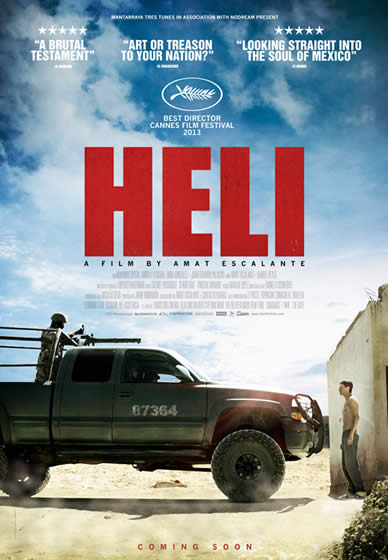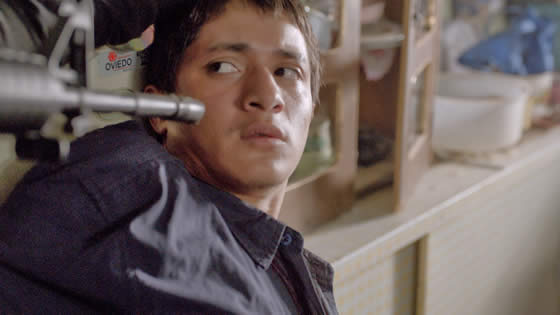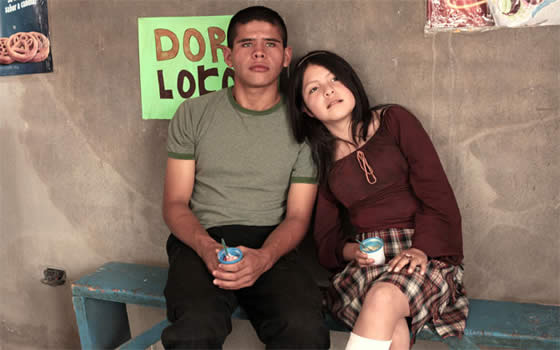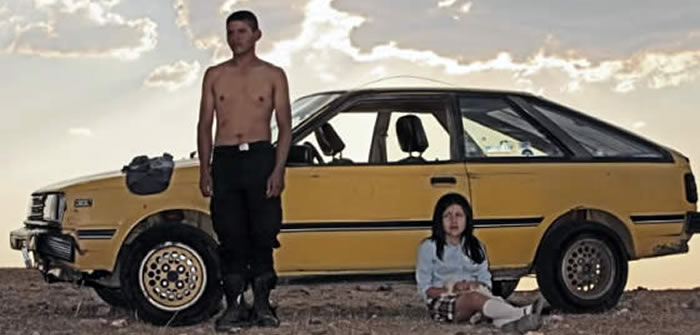 HELI, a film directed by Amat Escalante is an amazing and interesting film that has won the Best Director award at Cannes Film Festival 2013.
HELI, a film directed by Amat Escalante is an amazing and interesting film that has won the Best Director award at Cannes Film Festival 2013.
Heli is a young man working in a car assembly factory; he lives with his father who also works there, his wife Sabrina, his baby son Santiago and his sister Estela. His life is normal, slow, and without prospects.
Estela is revealed to be in a relationship with Beto, a cadet who at 17 is much older than her. Estela, despite Beto’s enthusiasm for engaging in sexual relations, is firm in her refusal of him, out of fear of becoming pregnant. Beto proposes they marry and run away together. To do so, he plans to sell some stolen cocaine packages that a corrupt general secretly drew from a cache the army confiscated and burned in an official event. Beto hides the drugs in Heli’s house with Estela’s consent until the sale. However, Heli discovers the affair and reprimands his sister, locking her in her room, after secretly disposing of the drugs in an isolated water pit for cattle.
Later that night, some federal policemen storm Heli’s house, killing Heli’s father when he tries to defend himself thinking they were being assaulted. The officers take Heli and Estela by force (Sabrina and their son not being present at the time) and with a badly beaten Beto they try to find the stolen cocaine. When they find out Heli destroyed the package, the policemen abandon Heli’s father’s body on the road, and drive to a secure house where drug dealers harshly torture Beto to the point of killing him. Heli’s life is spared, but Estela is taken elsewhere. The dealers hang Beto’s body from a pedestrian bridge, leaving a badly hurt Heli at the scene.
Heli manages to walk back home and the local police, learning of the incident, help Heli to heal and find the body of his father. Later they take Heli’s testimony; however, the police assume Heli and his father are involved with drug dealing and decide not to help them because Heli, shaken and scared, is not willing to tell what happened nor to sign any written testimony in fear of having himself or his father framed as criminals.
Heli has to deal with the traumas inflicted by these experiences and with the corruption of the police, while his wife begins to distance herself from him due to the erratic and even violent behavior he  begins to display. After going back to work at the car assembly plant, Heli gets distracted on the job and is eventually fired. The female detective assigned to his case, after learning that Estela was Beto’s girlfriend, asserts that the file of the case is closed, and makes sexual advances on Heli, which are initially reciprocated but eventually rejected.
begins to display. After going back to work at the car assembly plant, Heli gets distracted on the job and is eventually fired. The female detective assigned to his case, after learning that Estela was Beto’s girlfriend, asserts that the file of the case is closed, and makes sexual advances on Heli, which are initially reciprocated but eventually rejected.
Estela returns home, traumatized to the point of losing the speech and pregnant beyond the stage she can legally have an abortion. Heli and Sabrina comfort her, and Estela draws a map to the location she was held and raped….
Bijan Tehrani: How did you come up with the idea of HELI?
Amat Escalante: It was five years in the making when I was trying to get funding for the movie and at the same time I was writing, usually I get my ideas by images that I receive and I think of this usually when I am walking through locations that I will shoot in later from–for example, I had a scene of a young man looking for his father in the countryside and it triggered a story that developed and changed and became what the movie HELI. Then I worked in the place that I am going to film and the context of the situation and that is how I developed the location and situation. Now, in Mexico we have situations with corruption, and injustice is very strong and this way of life has invaded many parts of the country and it was natural for me to speak of those things.
BT: It is a very brave story to tell and in many cases people are trying to come with some sort of relief ending for the audience but you avoided this, how did you go about developing the screenplay for the story and how much of the screenplay was based on real life events?
AE: Everything has happened but nothing was based on an actual case for something that I investigated, everything has happened, all the things that happen in movie everyone knows that they have happened to someone and have happened so many times so they know that no one story is specific, I just created a story to tell with these ideas and situations. Initially, I spent three years on the script, and I then rewrote it with someone else and I wanted to tell a story about this car assembly factory about a family that would be living there and would try to be a law abiding family and how the family would be disintegrated, and in the second half of the movie, the family would try to become a whole again. The idea for the movie being that we wanted to show what happens when the government and society abandons its people, its children and its young people and that is why the movie is filled with young people and in the future, I find hope and salvation, to take care of the coming generations.
BT: How did you go about casting HELI?
AE: When I’m writing, I’m inspired by a lot of people, so when I see someone in the street that inspires me, I try to put them in my movie and that is how I went about casting. So, most of the people in the movie have never acted- the main two characters have never acted before and I was lucky to find them and work with them. That is kind of how it is, I write a script that is not written in stone and the day of shooting, the actors don’t read the script, and if they want to accept the movie, the day before a scene I re-write the dialogue so that they can say it the way they want to say it. I do a lot of preparation, and story boarding, and let the script take on a life of its own, and let life and surprises happen.
BT: How much do you think your film can help bring the issues of Mexico to the eyes of the people in Mexico and outside of Mexico?
AE: I think if one is sick or has a problem it is never bad if other people know about it or if other people are aware, I’m not sure how it can make a change, but it’s good to explore these tough situations oneself, and that’s what brings value- to shine a light on the hardships and injustices, and hopefully through art, make a change, is always a positive thing. I don’t think I would have to justify it, but I think that there is a sense of importance, and life should be represented on film, because sometimes, once in a while and I think in Mexico we have been infected by a virus for many years and many people have lost their lives, where 100,000 people have been murdered just by the drug cartels and the corruption,- this whole unstable system that’s in place, is happening and that is why people are tired and are taking the law into their own hands. There are groups of people now in Mexico in towns that are creating their own jails and their own law systems to get the criminals because they feel like the government has abandoned them.
to explore these tough situations oneself, and that’s what brings value- to shine a light on the hardships and injustices, and hopefully through art, make a change, is always a positive thing. I don’t think I would have to justify it, but I think that there is a sense of importance, and life should be represented on film, because sometimes, once in a while and I think in Mexico we have been infected by a virus for many years and many people have lost their lives, where 100,000 people have been murdered just by the drug cartels and the corruption,- this whole unstable system that’s in place, is happening and that is why people are tired and are taking the law into their own hands. There are groups of people now in Mexico in towns that are creating their own jails and their own law systems to get the criminals because they feel like the government has abandoned them.
BT: How did you come up with the visual style of HELI?
AE: I’m am very inspired with telling a story through images. Oddly enough, I have also been very inspired by Abbas Kiarostami, and his Taste the Cherry, My Friends House as well as many of his other movies. In general, a lot of Iranian cinema has influence me. Iranian cinema has very beautiful poetry of life and that has inspired me a lot and if you can look at certain things in a certain way there is this beauty in the situation in a way that many Iranian films have done. I think that the locations that we film have a lot to do with this, because there is something very powerful about the place and it is not just a room, but rather, a landscape. I wanted to make sure that in the film, the locations were very much felt and seen.
BT: What do you think are the chances of HELI receiving a theatrical release in the US?
AE: I tried to make a movie that excites people and entertains people and makes people jump and scream and laugh, I tried all these things and I tried to tell a story that one can grab onto in the film, so I think that helps and it’s a movie that I have high hopes for, even Spielberg liked it and he is a filmmaker that is very popular so I am hoping that things will go well, so we all hope for the best but we don’t know how a film will be received; but there is excitement about the film and I think that this is a film that people will not easily forget.

